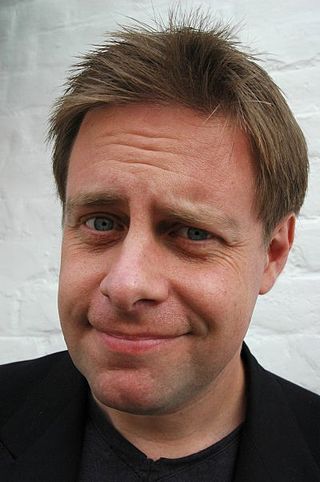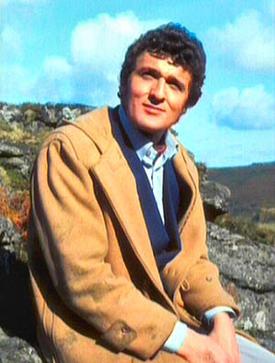
Stephen Russell Davies, better known as Russell T Davies, is a Welsh screenwriter and television producer whose works include Queer as Folk, Bob & Rose, The Second Coming, Casanova, the 2005 revival of the BBC One science fiction franchise Doctor Who, Torchwood, The Sarah Jane Adventures, Cucumber, A Very English Scandal, Years and Years, It's a Sin and Nolly.

Dark Season is a British science-fiction television serial for adolescents, screened on BBC1 in late 1991. Comprising six 25-minute episodes, the two linked three-part stories tell the adventures of three teenagers and their battle to save their school and their classmates from the actions of the sinister Mr Eldritch. It was the first television drama to be written by Russell T Davies, and is also noteworthy for co-starring a young Kate Winslet in her first major television role.

Paul Douglas Cornell is a British writer best known for his work in television drama as well as Doctor Who fiction, and as the creator of one of the Doctor's spin-off companions, Bernice Summerfield.

The Virgin New Adventures are a series of novels from Virgin Publishing based on the British science-fiction television series Doctor Who. They continued the story of the Doctor from the point at which the television programme went into hiatus from television in 1989.
Lawrence Miles is a science fiction author known for his work on original Doctor Who novels and the subsequent spin-off Faction Paradox. He is also co-author of the About Time series of Doctor Who critiques.
Doctor Who spin-offs refers to material created outside of, but related to, the long-running British science fiction television series Doctor Who.

Harry Sullivan is a fictional character from the British science-fiction television series Doctor Who and is a companion of the Fourth Doctor. Played by Ian Marter, the character appears as a regular during the programme's twelfth season in 1974–1975. Harry appeared in 7 stories.
Lance Parkin is a British author. He is best known for writing fiction and reference books for television series, in particular Doctor Who and as a storyliner on Emmerdale.

Sarah Jane Smith is a fictional character played by Elisabeth Sladen in the long-running BBC Television science fiction series Doctor Who and two of its spin-offs. Sarah Jane is a dogged investigative journalist who first encounters alien time traveller the Doctor while trying to break a story on a top secret research facility, and subsequently becomes his travelling companion on a series of adventures spanning the breadth of space and time. After travelling with The Doctor in four seasons of the show they suddenly part ways, and after this she continues to investigate strange goings-on back on Earth. Over time, Sarah Jane establishes herself as a committed defender of Earth from alien invasions and other threats, occasionally reuniting with The Doctor in the course of her own adventures, all the while continuing to work as a freelance investigative journalist.

K9, occasionally written K-9, is the name of several fictional robotic canines in the long-running British science fiction television series Doctor Who, first appearing in 1977. K9 has also been a central character in three of the series' television spin-offs: the one-off K-9 and Company (1981), The Sarah Jane Adventures (2007–2011) and K-9 (2009–2010). Although not originally intended to be a recurring character in the series, K9 was kept in the show following his first appearance because he was expected to be popular with younger audiences. There have been at least four separate K9 units in the series, with the first two being companions of the Fourth Doctor. Voice actor John Leeson has provided the character's voice in most of his appearances, except during season 17 of Doctor Who, in which David Brierley temporarily did so. The character was created by Bob Baker and Dave Martin, to whom rights to the character still belong; consequently, Baker's spin-off series K9, which is not BBC-produced, could not directly reference events or characters from Doctor Who, though it attempted to be a part of that continuity.
Yasmin Bannerman is an English actress. Bannerman was born and brought up in Gloucestershire and attended the Rose Bruford College in London until 1993. She has had roles in television series such as Hollyoaks, Cold Feet, Merseybeat and Doctor Who, and in the films Maybe Baby and Killing Me Softly.
Jacqueline Rayner is a British author, best known for her work with the licensed fiction based on the long-running British science fiction television series Doctor Who.
Gareth John Pritchard Roberts is a British television screenwriter, novelist and columnist best known for his work related to the science-fiction television series Doctor Who. He has also worked on various comedy series and soap operas.

Just War is a novel by Lance Parkin from the Virgin New Adventures. The New Adventures were based on the long-running British science fiction television series Doctor Who. The novel featured the characters of the Seventh Doctor, Bernice Summerfield, Chris Cwej and Roz Forrester.

Original Sin is an original novel written by Andy Lane and part of the Virgin New Adventures based on the long-running British science fiction television series Doctor Who. It introduces the Seventh Doctor's new companions Roz Forrester and Chris Cwej.

Cold Fusion is an original novel written by Lance Parkin and based on the long-running British science fiction television series Doctor Who. It features the Fifth Doctor, with Adric, Nyssa, and Tegan, immediately after Castrovalva. Also appearing is the Seventh Doctor, with Chris and Roz, from between the Virgin New Adventures novels Return of the Living Dad and The Death of Art. It was the only one of the Virgin Doctor Who novels to feature more than one Doctor.

Christmas on a Rational Planet is an original novel written by Lawrence Miles and based on the long-running British science fiction television series Doctor Who. It features the Seventh Doctor, Chris and Roz.

Deadfall is an original novel by Gary Russell featuring the fictional archaeologist Bernice Summerfield. The New Adventures were a spin-off from the long-running British science fiction television series Doctor Who.
Travis Oliver is a British actor. He is possibly best known for his role as Oliver Ryan in the ITV series Footballers' Wives: Extra Time between 2005 and 2006. He's also made appearances in BBC's Doctor Who (2007) and the film Lesbian Vampire Killers (2009).










